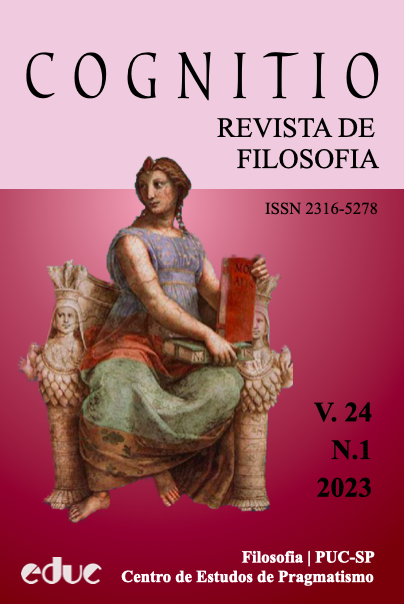Observações sobre o nominalismo de Tarski
DOI:
https://doi.org/10.23925/2316-5278.2023v24i1:e58224Palavras-chave:
Comprometimento ontológico, Nominalismo, Pragmatismo, TarskiResumo
Neste artigo, farei algumas observações sobre o nominalismo de Tarski. Primeiro, mostrarei que, embora tenha sido desenvolvida principalmente em conversas e palestras privadas, Tarski tentou desenvolver uma teoria nominalista rigorosa, que mostra que a questão tinha alguma importância para ele. Em particular, mostro como a formulação de Tarski se baseia na ideia de uma linguagem humanamente compreensível e mostro como ele tentou desenvolver essa ideia ao longo de sua carreira. Infelizmente, embora sua formulação seja interessante, parece enfrentar um obstáculo intransponível, que examino detalhadamente no artigo. Finalmente, apresento algumas observações sobre o que correu mal com o programa nominalista de Tarski.
Referências
BENACERRAF, Paul. Mathematical Truth. In: BENACERRAF, Paul; PUTNAM, Hilary (eds.). Philosophy of Mathematics: Selected Readings. 2 ed. Cambridge: Cambridge University Press, 1983. p. 403-420.
BETH, Evert Willem. Reason and Intuition. In: BETH, Evert Willem. Aspects of Modern Logic. Dordrecht- -Holland: D. Reidel Publishing Company, 1970.
BURGESS, John P.; ROSEN, Gideon. A Subject with no Object: Strategies for Nominalist Interpretations of Mathematics. Oxford: Oxford University Press, 1997.
COWLING, Sam. Abstract Entities. New York: Routledge, 2017. CREATH, Richard. Understandability. Metascience, v. 25, p. 25-30, 2015.
DAVIDSON, Donald. Theories of Meaning and Learnable Languages. In: Inquiries into Truth and Interpre- tation. Oxford: Oxford University Press, 1984. p. 3-15.
DUMMETT, Michael. The Philosophical Significance of Gödel’s Theorem. In: Truth and Other Enigmas. Cambridge, Massachusetts: Harvard University Press, 1978. p. 186-201.
FROST-ARNOLD, Greg. Carnap, Tarski, and Quine at Harvard: Conversations on Logic, Mathematics, and Science. Chicago, Illinois: Open Court, 2013.
FROST-ARNOLD, Greg. Replies to Creath, Ebbs, and Lavers. Metascience, v. 25, p. 43-49, 2015. HELLMAN, Geoffrey. Mathematics without Numbers: Towards a Modal-Structural Interpretation. New York: Clarendon, 2006.
HODES, Harold T. Why Ramify?. Notre Dame Journal of Formal Logic, v. 56, p. 379-415, 2015.
HOOK, Julian L. A Many-Sorted Approach to Predicative Mathematics. PhD Thesis. Princenton: Princenton University, 1983.
KAPLAN, David. “Opacity”. In: HAHN, Lewis Edwin; SCHILPP, Paul Arthur (eds.). The Philosophy of W. V. O. Quine. La Salle: Open Court, 1986. p. 229-289.
KLEMENT, Kevin C. The Functions in Russell’s No Class Theory. The Review of Symbolic Logic, v. 3, p. 633-664, 2010.
KLEMENT, Kevin C. A Generic Russellian Elimination of Abstract Objects. Philosophia Mathematica, v. 25, p. 91-115, 2017.
KRIPKE, Saul. Is There a Problem about Substitutional Quantification?. In: EVANS, Gareth; MCDOWELL, John (eds.). Truth and Meaning. New York: Oxford University Press, 1976. p. 325-419.
LANDINI, Gregory. Russell’s Hidden Substitutional Theory. Oxford: Oxford University Press, 1998. LEVY, Arnon; GODFREY-SMITH, Peter (eds.). The Scientific Imagination: Philosophical and Psychological Perspectives. Oxford: Oxford University Press, 2020.
LEPORE, Ernest; LUDWIG, Kirk. Donald Davidson: Meaning, Truth, Language, and Reality. Oxford: Ox- ford University Press, 2005.
LINNEBO, Øysten. Thin Objects: An Abstractionist Account. Oxford: Oxford University Press, 2018.
MANCOSU, Paolo. Harvard 1940-1941: Tarski, Carnap, and Quine on a Finitistic Language of Mathematics for Science. In: The Adventure of Reason: Interplay between Philosophy of Mathematics and Mathematical Logic, 1900-1940. New York: Oxford University Press, 2010a. p. 361-386.
MANCOSU, Paolo. Quine and Tarski on Nominalism. In: The Adventure of Reason: Interplay between Phi- losophy of Mathematics and Mathematical Logic, 1900-1940. New York: Oxford University Press, 2010b. p. 387-409.
NELSON, Edward. Predicative Arithmetic. Princeton, New Jersey: Princeton University Press, 1986. PARSONS, Charles. Ontology and Mathematics. In: Mathematics in Philosophy: Selected Essays. Ithaca, New York: Cornell University Press, 1983. p. 37-62.
QUINE, Willard Van Orman. Truth and Disquotation. In: The Ways of Paradox and Other Essays. Revised and Enlarged Edition. Cambridge, Massachusetts: Harvard University Press, 1976. p. 308-321.
RODRÍGUEZ-CONSUEGRA, Francisco. Tarski’s Intuitive Notion of Set. In: SICA, G (ed.). Essays on the Foundations of Mathematics and Logic. Monza: Polimerca, 2005. p. 227– 266.
SIEG, Wilfried. Hilbert’s Programs and Beyond. Oxford: Oxford University Press, 2013.
SOAMES, Scott. The Analytic Tradition in Philosophy, Volume 1: The Founding Giants. Princeton, New Jersey: Princeton University Press, 2014.
TAKEUTI, Gaisi; ZARING, Wilson. Introduction to Axiomatic Set Theory. 2 ed. New York: Springer, 1982.
TARSKI, Alfred. The Concept of Truth in Formalized Languages. In: Logic, Semantics, Metamathematics. 2 ed. Indianapolis, Indiana: Hackett Pub., 1983. p. 152–278.
TARSKI, Alfred. Two Unpublished Contributions by Alfred Tarski. History and Philosophy of Logic, v. 28, p. 257-264, 2007.
TARSKI, Alfred; MOSTOWSKI, Adrzej; ROBINSON, Raphael. Undecidable Theories. New York: Dover, 2010.
WETZEL, Linda. Types and Tokens: On Abstract Objects. Cambridge, Massachusetts: The MIT Press, 2009.
Downloads
Publicado
Como Citar
Edição
Seção
Licença
Copyright (c) 2022 http://creativecommons.org/licenses/by/4.0/

Este trabalho está licenciado sob uma licença Creative Commons Attribution 4.0 International License.









